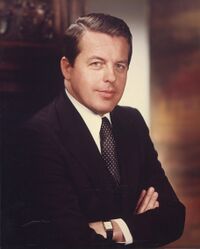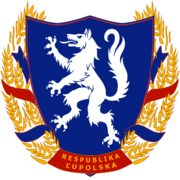Emil Ivanušić: Difference between revisions
No edit summary |
No edit summary |
||
| (24 intermediate revisions by the same user not shown) | |||
| Line 6: | Line 6: | ||
|caption = | |caption = | ||
|office = President of Luepola | |office = [[President of Luepola]] | ||
| | |primeminister = [[Ogňan Cărnević]]<br>[[Luka Marinković]] | ||
|term_start = | |vicepresident = [[Branimir Raganović]]<br>Ogňan Cărnević | ||
|term_start = 2 November 1980 | |||
|term_end = 27 July 1993 | |term_end = 27 July 1993 | ||
|predecessor = | |predecessor = Himself <small>(As president of the [[State of Luepola]])</small><br>[[Mateus Branković]] | ||
|successor = [[ | |successor = Himself <small>(As president of the [[Republic of Luepola]])</small><br>[[Paveu Franić]] | ||
|birth_name = Emil Tihomir Ivanušić | |birth_name = Emil Tihomir Ivanušić | ||
| Line 25: | Line 19: | ||
|death_date = {{Death date and age|2016|4|1|1931|7|16|df=yes}} | |death_date = {{Death date and age|2016|4|1|1931|7|16|df=yes}} | ||
|death_place = Ľaskona, Trnava, [[Luepola]] | |death_place = Ľaskona, Trnava, [[Luepola]] | ||
|party = | |party = Independent<br>[[Republican Party (Luepola)|Republican]] <small>(1985-2016)</small> | ||
|spouse = Cvieta | |spouse = Cvieta Pavlakovna Ivanuška {{small|(1988–2016)}} | ||
|alma_mater = Grast Institute of Arts and Sciences | |alma_mater = Grast Institute of Arts and Sciences | ||
|signature = | |signature = | ||
|allegiance = {{flag|Luepola}} | |allegiance = {{flag|People's Republic of Luepola}}<br>{{flagicon|Luepola}} [[Luepola|Republic of Luepola]] | ||
|branch ={{flagicon|Luepolanrebel}} Luepolan Liberation Army | |branch = {{flagicon|People's Republic of Luepola}} Luepolan People's Army<br>{{flagicon|Luepolanrebel}} Luepolan Liberation Army | ||
|serviceyears= | |serviceyears= 1948<br>1979-1985 | ||
|battles = [[Luepolan War]] | |battles = [[Great War (Vasarden)|Great War]]<br>[[Luepolan War]] | ||
}} | }} | ||
'''Emil Ivanušić''' (16 July 1931 – 1 April 2016) was a [[Luepola|Luepolan]] statesman, activist, and military commander. Over the course of his life, he | '''Emil Ivanušić''' ({{IPA-lupl|eˈmil iˈvanuʃic|lang}}; 16 July 1931 – 1 April 2016) was a [[Luepola|Luepolan]] statesman, activist, and military commander. Over the course of his life, he participated in a series of activist movements in the [[State of Luepola]]- largely a client state of the [[Vierz Empire]]- protesting against the continued presence of Vierz troops on Luepolan soil and against Vierz control over Luepola's affairs. His efforts culminated in organizing large protests that exploded into the [[March Uprising (Vasarden)|March Uprising]], where he was thrust to the forefront of the nation as the ''de facto'' leader of the anti-government, anti-Vierz movement. Upon the ousting of [[Zdrávko Kasun]] by the [[Sliet]] in 1980, Ivanušić was thrust to the forefront of Luepolan politics, and was invited to assist with the government of [[Mateus Branković]] as it began to withdraw Luepola from the Vierz sphere of influence. | ||
Shortly after the start of the [[Luepolan War]], Ivanušić was nominated by the [[Sliet]] to replace Branković as president of Luepola. From that point, he commanded and coordinated Luepolan and Vorochian forces alongside his Vorochian counterpart [[Danylo Ruda]] against the [[Reichswehr (Vierzland)|Vierz army]]. He was the chief representative of Luepola in peace talks at the end of the war, signing the [[Treaty of Skalla]] that ended the Luepolan war. | |||
After the war, Ivanušić was elected in Luepola's first two free and fair elections since 1901. Significant achievements of his presidency included salvaging the war-damaged Luepolan economy and enabling following administrations to continue its growth, ending the rivalry between the Communist and Democratic armies immediately after the Luepolan War, and using the nascent country's geopolitical middle ground between [[Vonzumier]] and the [[Aitic Federation]] to encourage warming of relations between the two powers. While having little further involvement in Vierz affairs following the Treaty of Skalla, he is recognized by many as a key contributor to the end of the Vierz Empire, which occurred during his tenure as president. | |||
For his pivotal role in the [[Luepolan Spring]], Ivanušić is considered the father of modern Luepola. His funeral in April 2016 surpassed that of [[Lev Gincburg]] in both adjusted budget and attendance, and hundreds of landmarks across the country have been renamed in his honor. | |||
[[Category:Vasarden]] | |||
[[Category:Luepola]] | |||
[[Category:Leaders of Luepola]] | |||
[[Category:Silent War]] | |||
[[Category:Luepolan Spring]] | |||
{{Luepola Topics}} | |||
Latest revision as of 17:26, 19 July 2021
This article is incomplete because it is pending further input from participants, or it is a work-in-progress by one author. Please comment on this article's talk page to share your input, comments and questions. Note: To contribute to this article, you may need to seek help from the author(s) of this page. |
Emil Ivanušić | |
|---|---|
 | |
| President of Luepola | |
| In office 2 November 1980 – 27 July 1993 | |
| Prime Minister | Ogňan Cărnević Luka Marinković |
| Vice President | Branimir Raganović Ogňan Cărnević |
| Preceded by | Himself (As president of the State of Luepola) Mateus Branković |
| Succeeded by | Himself (As president of the Republic of Luepola) Paveu Franić |
| Personal details | |
| Born | Emil Tihomir Ivanušić 16 July 1931 Grast, Trnava, People's Republic of Luepola |
| Died | 1 April 2016 (aged 84) Ľaskona, Trnava, Luepola |
| Political party | Independent Republican (1985-2016) |
| Spouse | Cvieta Pavlakovna Ivanuška (1988–2016) |
| Alma mater | Grast Institute of Arts and Sciences |
| Military service | |
| Allegiance | |
| Branch/service | |
| Years of service | 1948 1979-1985 |
| Battles/wars | Great War Luepolan War |
Emil Ivanušić (Luepolan: [eˈmil iˈvanuʃic]; 16 July 1931 – 1 April 2016) was a Luepolan statesman, activist, and military commander. Over the course of his life, he participated in a series of activist movements in the State of Luepola- largely a client state of the Vierz Empire- protesting against the continued presence of Vierz troops on Luepolan soil and against Vierz control over Luepola's affairs. His efforts culminated in organizing large protests that exploded into the March Uprising, where he was thrust to the forefront of the nation as the de facto leader of the anti-government, anti-Vierz movement. Upon the ousting of Zdrávko Kasun by the Sliet in 1980, Ivanušić was thrust to the forefront of Luepolan politics, and was invited to assist with the government of Mateus Branković as it began to withdraw Luepola from the Vierz sphere of influence.
Shortly after the start of the Luepolan War, Ivanušić was nominated by the Sliet to replace Branković as president of Luepola. From that point, he commanded and coordinated Luepolan and Vorochian forces alongside his Vorochian counterpart Danylo Ruda against the Vierz army. He was the chief representative of Luepola in peace talks at the end of the war, signing the Treaty of Skalla that ended the Luepolan war.
After the war, Ivanušić was elected in Luepola's first two free and fair elections since 1901. Significant achievements of his presidency included salvaging the war-damaged Luepolan economy and enabling following administrations to continue its growth, ending the rivalry between the Communist and Democratic armies immediately after the Luepolan War, and using the nascent country's geopolitical middle ground between Vonzumier and the Aitic Federation to encourage warming of relations between the two powers. While having little further involvement in Vierz affairs following the Treaty of Skalla, he is recognized by many as a key contributor to the end of the Vierz Empire, which occurred during his tenure as president.
For his pivotal role in the Luepolan Spring, Ivanušić is considered the father of modern Luepola. His funeral in April 2016 surpassed that of Lev Gincburg in both adjusted budget and attendance, and hundreds of landmarks across the country have been renamed in his honor.
